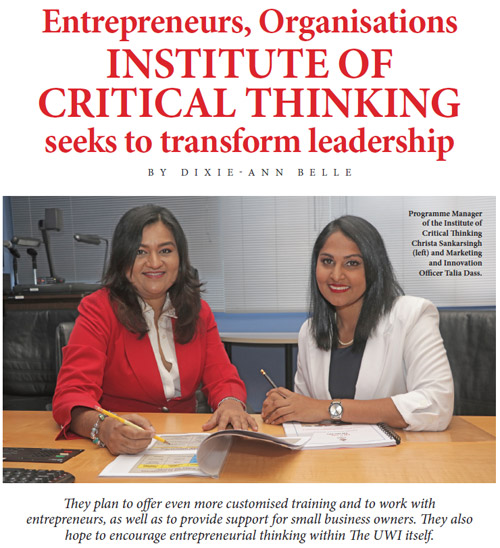
 The Caribbean is fertile ground for great minds, exceptional talents and inspirational leaders. The Caribbean is fertile ground for great minds, exceptional talents and inspirational leaders.
As a young society, we have made great strides and we have much more to do to realise our full potential.
“There’s a need for something more in terms of leadership in our region,” notes Christa Sank-arsingh, Programme Manager of the Institute of Critical Thinking (ICT). “It’s not that we don’t have the intellectual capacity, the wherewithal, and the resilience as a people to do more.”
The “something more” is what the institute helps provide.
Perched on the top floor of the Centre for Language Learning building, the ICT has a panoramic view of the beautiful, tropical gardens of the St Augustine Campus. The state-of the art learning spaces demonstrate that it is an entity with a mission and goals that have the potential to trans-form Caribbean organisations - the way we think, the way we strategise, the way we lead. Ac-cording to Sankarsingh, the ICT is working to create an environment for Caribbean leaders to get out of fire-fighting mode and develop themselves into the adaptive leaders our region needs for transformation.
The institute is a multidisciplinary learning and performance establishment focused on leadership development. One of its major advantages is that it has access to the international partners, knowledge and expertise of scholars and educators of The UWI. The ICT works with experts in management, law, medical sciences, engineering, mathematics, economics, computer science, the physical sciences and the humanities to give multiple perspectives to solving the complex problems our societies face
Initially developed by Dr Bhoendradatt Tewarie (then Campus Principal and Pro Vice-Chancellor) in 2007, to improve teaching and learning on campus, ICT refocused its mission in 2014 to provide leadership training and development beyond St Augustine. They work closely with The UWI, its faculties and departments, to build relationships with the wider society
Sankarsingh, who is a proponent of Adaptive Leadership à la Harvard University, says, “we want them (leaders) to be on board and partnering with us, so that we could serve the needs of our na-tional and regional community.”
The Institute’s strategy is not founded only on abstract ideas but implemented through practical exercises. ICT holds executive development workshops in collaboration with various researchers across campus faculties. They also work closely with companies in the private, public and civil sectors. The institute develops systems and processes to foster innovative thinking and to de-velop ways to improve sustainability.
And despite the challenges companies face with shrinking budgets, many embrace this mind-set. “We develop solutions specific to your organisation and we help you to diagnose and craft solu-tions for your specific needs,” expounds the programme manager. As a result, the ICT has influ-enced companies in finance, energy, manufacturing and more. Their efforts have led to the crea-tion of innovation departments and high performing teams.
However, despite their ambitious goals, you won’t see the ICT’s services splashed across bill-boards or in full page ads. Talia Dass, the institute’s Marketing and Innovation Officer, says their marketing is based on building relationships and fostering engagement.
“We want to communicate on a personal level and understand the needs of our partners,” she de-clares.
They reach out through e-mails, social media and their website. Dass and Sankarsingh even assist in conducting workshops, so they are well known by their partners. Sessions involve role playing, slides, multimedia, case studies, peer to peer dialogue and group and individual exercises.
Participants are key to the agenda and to how findings are implemented. “I love the fact that new ideas are encouraged, and we are able to see those ideas brought to life,” observes Dass.
Sankarsingh adds, “I love the reaction of participants at the end. They’re always happy to have been a part of the experience, leaving with new insights and motivated to take on the challenges ahead.”
The ICT team is clearly committed to continuous transformation within the University and wider society. “Despite the fact that we are a small team, we are powerful. When our ideas are com-bined, we accomplish great things,” affirms Sankarsingh.
Dass says they are striving to reach wider markets. They plan to offer even more customised training and to work with entrepreneurs, as well as to provide support for small business owners. They also hope to encourage entrepreneurial thinking within The UWI itself.
“We’re in partnership with our own human resource department to do work to create that entre-preneurial, innovative mind-set on campus,” says the programme manager. After all, to be an Entrepreneurial University, we have to be an Entrepreneurial Thinking #TeamUWI.
ICT promotes the philosophy of “Leading through Learning”. As a leader in the 21st Century, a critical tool for success is to keep learning and reinventing yourself. A fixed mind-set is obsolete.
“The challenges that we face in today’s world aren’t always technical challenges, where one ex-pert leader has the solution; but complex, adaptive ones that need our collective intellect to solve” observes Sankarsingh.
The Institute, she says, is well placed to help overcome these obstacles. “We work with you, to co-create knowledge that you need to thrive in your environment. That is what makes us differ-ent from anybody else operating anywhere else in the Caribbean”.
To contact the Institute of Critical Thinking, email ict@sta.uwi.edu or call 662-2002 extension 83310
Dixie-Ann Belle is a freelance writer, editor and proofreader.
|





